Is Knowledge Power? Scholar Aleksej Starobinskij Questions Theologians
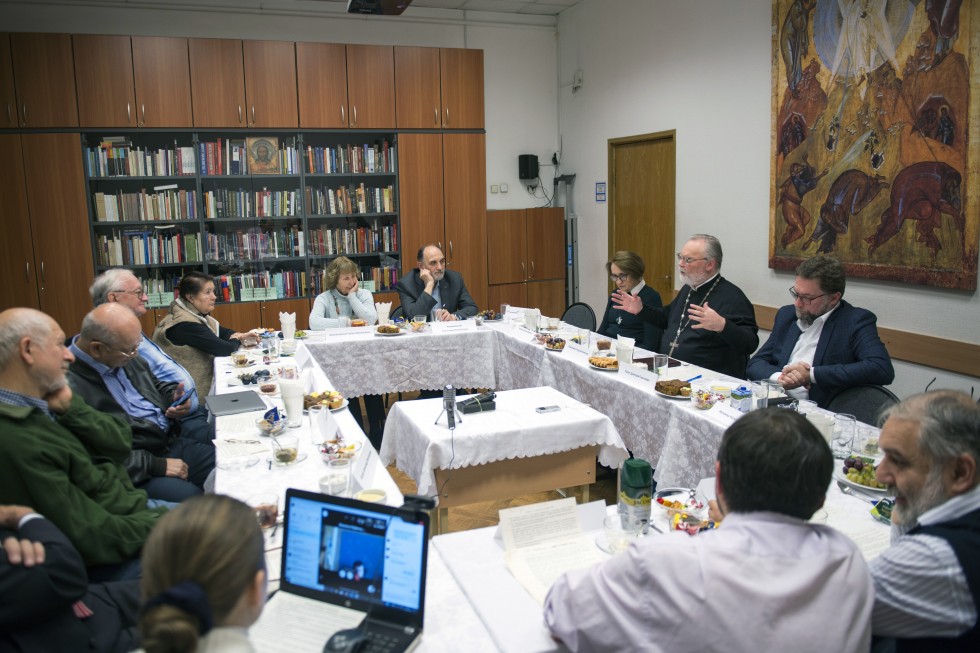
What is the role of knowledge in religion and how does knowledge differ from revelation sent from above? Can we say, to paraphrase a well-known saying, “Spiritual knowledge is spiritual power?” Do theologians agree with such a proposition?
“This is the question that came to mind when I was listening to Fr. Georgy speak at the opening ceremony of SFI’s new building,” scholar Aleksej Starobinskij tells us. “Fr. Georgy, in his sermon, was speaking about ‘wisdom from above’ and direct revelation from God. Let us presume that wisdom is higher than knowledge. But if revelation were sufficient for us to grasp higher reality then why are spiritual universities needed at all, and SFI in particular? I see that people here are striving specifically for knowledge – very nuanced knowledge, in fact – and not only cultural historical knowledge, but even directly for spiritual knowledge.
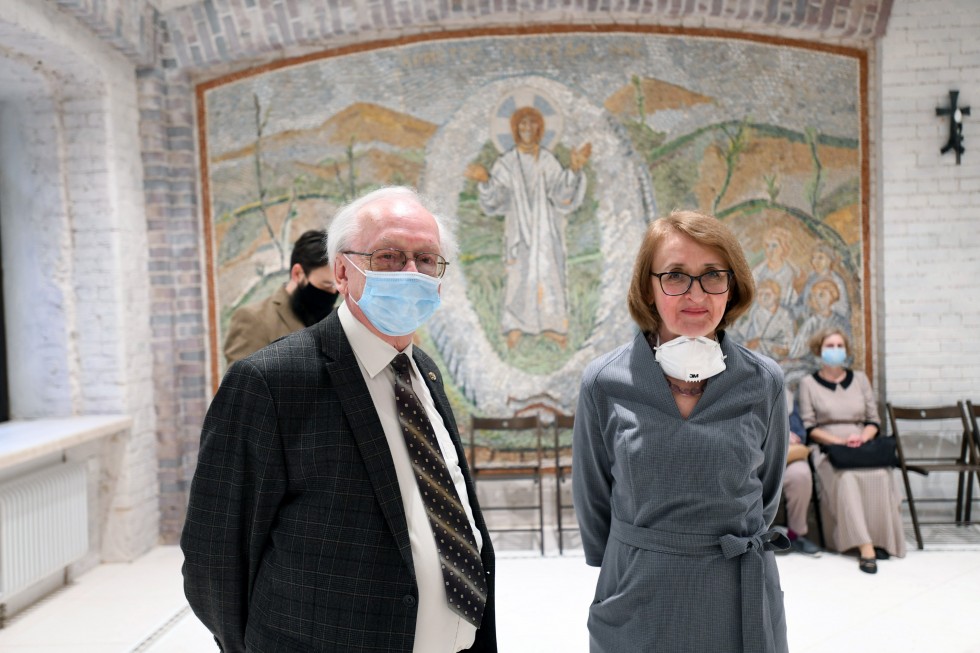
Alexey Starobinskij and Larisa Musina
“Not long ago I reviewed the materials connected to various attacks on Fr. Georgy,” added Starobinskij. “And it’s interesting that the criticism isn’t concerned with anything fundamental, but with things like, for instance, at what point the Ecumenical Councils should be studied. They criticize Fr. Georgy for starting with an explanation of principles and for putting off familiarity with the decisions of the Councils until a later point. This criticism reminds me of the insistence that the teaching of any subject in the humanities should begin with rote memorization of the decisions of Community Party Congresses.
“And this made me think about how to integrate the priority for wisdom sent from above (about which Fr. Georgy spoke in his sermon) and the results of, as you say, your fellowship with God, with the fact that you do, nevertheless teach history and Church Council decisions,” said Starobinskij. “Gennady was speaking of “eureka moments” of enlightenment, but these moments generally come after long years of study. You need knowledge, too, just like we scientists do. You mentioned that it is difficult to be a believer at this time. Would it be possible to say, for instance, that the acquisition of spiritual knowledge helps you believers to be stronger?”
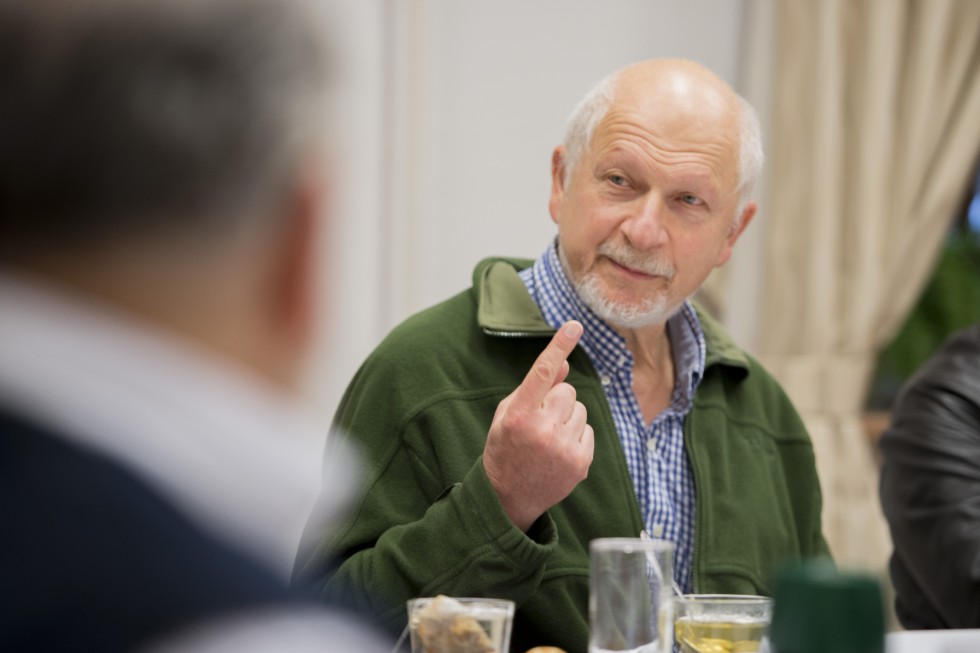
Gennady Gorelik – Research Fellow at the Centre for Philosophy and the History of Science at Boston University
“I think I could sign my name to that understanding of things,” said Fr. Georgy Kochetkov. “Yes, revelation is fundamental to the human being. As we all know, revelation presupposes synergy which is the fruit of fellowship between God and man. But education is also necessary. The uneducated mind is a narrow and primitive mind, and is, for that reason, subject to significant danger. The desire for deep knowledge, especially in the humanities, is something we don’t often see in our time. And we all lose a lot from this. Without deep knowledge, it is easy to fall into obscurantism and confusion. We stand against such confusion – whether in science, in the church, in society or in culture – and obscurantism is everywhere rife, which is why people often take objection to us. We don’t idealize ourselves, but we believe that there should be a demand for authentic knowledge within society. Spiritual mystical experience is important, but tradition is also important, and tradition needs to be taught and learned.”
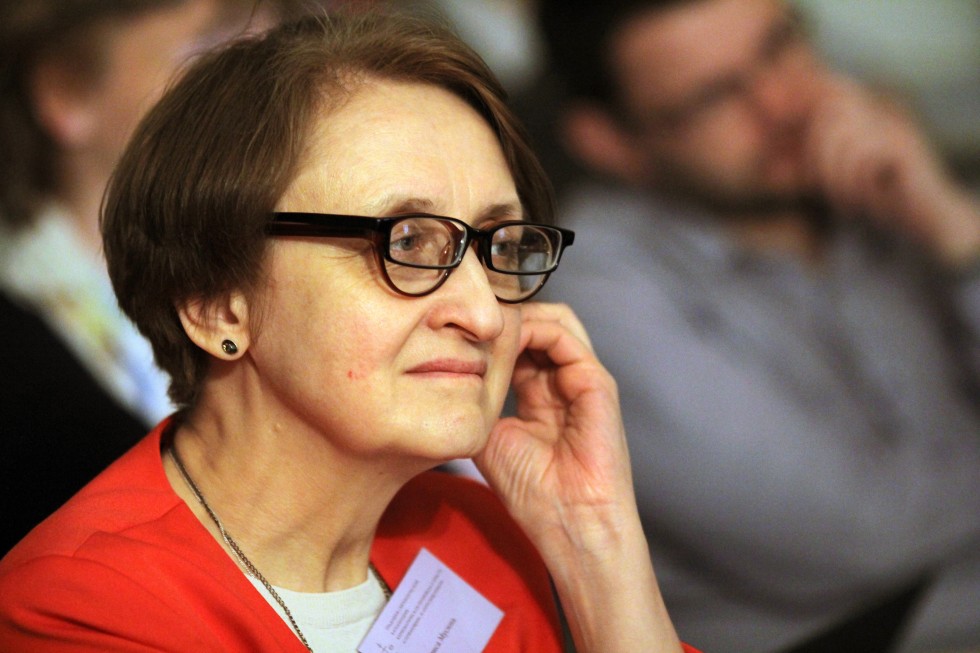
Larisa Musina
Larisa Musina, Vice Rector for Academic Work at SFI, believes that there is a big problem with knowledge of theology in Russia: “I am speaking of knowledge in the universal sense of the word. A very lot has been done in the world in the field of Theology over the past few centuries. And it is very damaging to us that Russia is behind by 100 years in practical terms, and that achievements make it into the Russian language auditorium only in a fragmentary fashion and only haphazardly. It’s at least very difficult to correct this damage, if it is possible at all.
“Theology in the simple, “secular” sense of the discipline, makes it possible for us to
transform Church History from myth into the real history of people’s search for God, and the search for life with God, and within this context, the search for life with each other,” explains Larisa Musina. “We should have taken lessons from this history, but it is often more convenient for us to accept myths. We should remember that our Lord became a human being and came right into history. This means that we shouldn’t be afraid of real history. But aside from direct damage, the situation within the Russian theological arena is further complicated by a colossal rift in the tradition of humanities teaching and studies. As a rule, most of the people who come to study at SFI have a higher education, but, even so, their background in the humanities is often very weak. So I can also sign my name to the idea that “spiritual knowledge is spiritual power.” But just as with any knowledge, it not only provides strength, but requires significant effort on our part.”
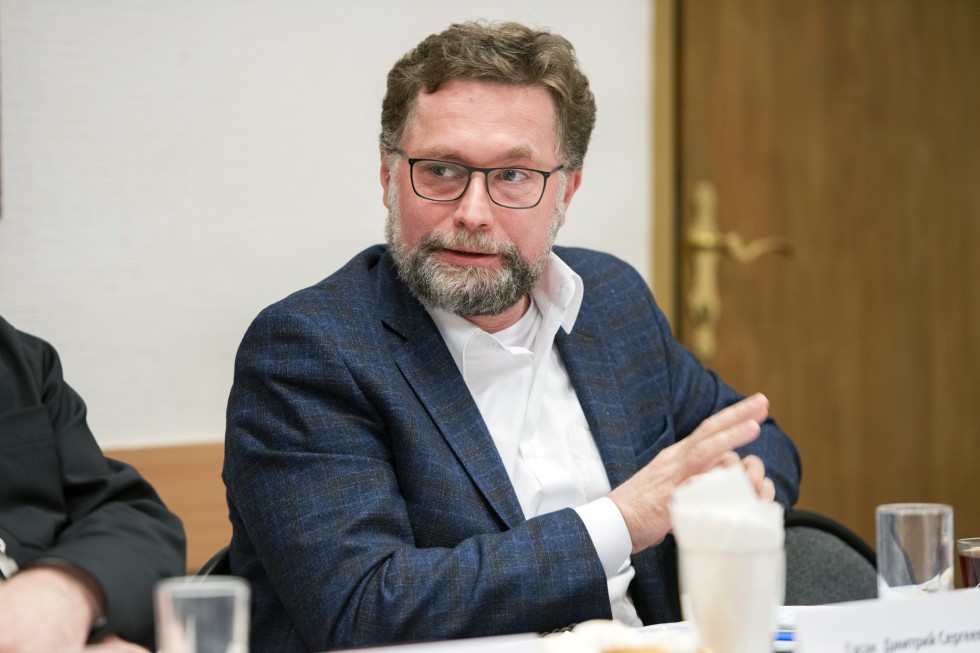
Dmitry Gasak
“One of the paradoxes of Christianity is that the experience of faith – unlike the experience of scientific knowledge – is open to everyone,” says Dmitry Gasak, First Vice Rector of SFI. “In the Gospel we find, for instance, the exhortation to ‘be like children’, and the accent here is on the idea that spiritual knowledge is more accessible to simple people than to scholars. And by the way, the phenomenon of church obscurantism is related to the fact that authentic spiritual knowledge, in its integrity, somehow eludes people who are closed off or who endeavour to grasp God’s mysteries only through discursive reason. But simplicity doesn’t imply simplification, and low cultural level also enables obscurantism. Moreover, the history of the church played out in such a way that the most educated among the apostles also became the most successful – I mean St. Paul the Apostle. And what does that imply? From where does spiritual knowledge – and that spiritual power we’re looking for – spring?
“Experience tells us that seminary education doesn’t always lead to spiritual wisdom," continued Gasak. “When gaining spiritual experience, the order of teaching (what we begin and end with) is important. The Gospel gives priority to an open heart, which in addition to gaining experience via the use of discursive reason also presupposes the possibility of gaining knowledge by faith. And I also agree that spiritual knowledge, in terms of gaining knowledge via faith is, without question, spiritual power.
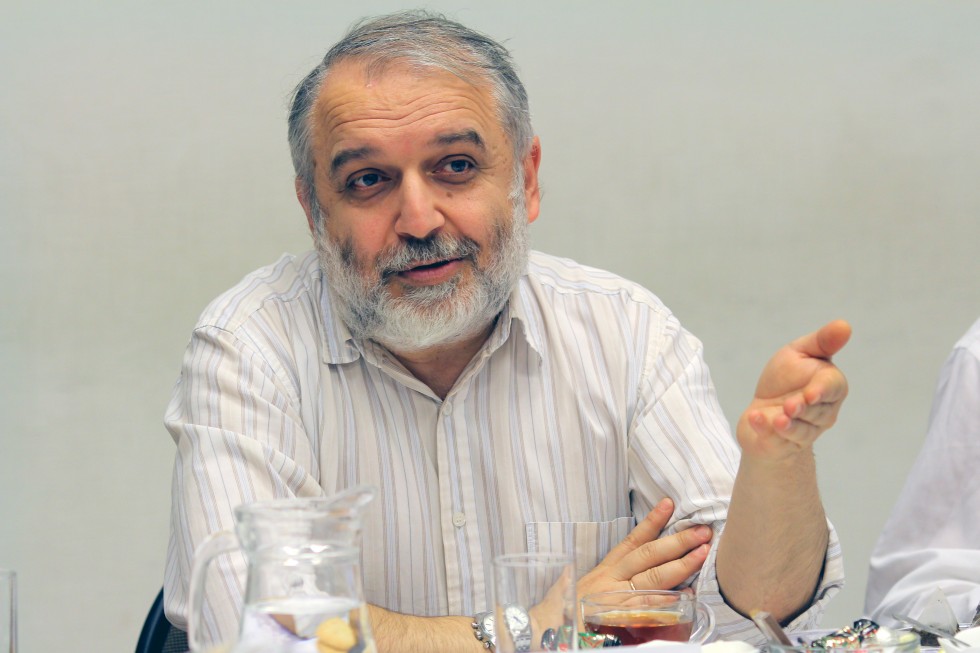
David Gzgzjan
“In general terms, I’m also ready to agree with that statement,” said Theology Faculty Dean, David Gzgzjan. “With the caveat that the original underlying saying – ‘knowledge is power’ – is sincerely optimistic and pregnant with superfluous self-assuredness. And as relates to spiritual knowledge, there are some possible stumbling blocks here, as well. First of all, spiritual knowledge can’t be considered a condition for faith. Everything is exactly the other way around: spiritual knowledge is only possible in such a case as a person has already experienced a living faith. On the other hand, gaining strength in the faith is impossible without spiritual knowledge, without tutelage, etc. But it’s worth remembering that spiritual knowledge is something about which to be ambivalent: in much wisdom is much grief. Knowledge doesn’t only give us positive experience of deeper faith, but the imperative to overcome ever possible doubt that may arise, and therefore also increases the risk of ending up on the wrong path…in other words here there is also an attending temptation to self-assuredness which it isn’t entirely possible to avoid.
“And I want to remind you that real obscurantists have never been people who are truly illiterate. They are all people who are actually well-educated in their way,” continued Gzgzjan. “The ‘culture’ of obscurantism demands a sort of sophistication. Russian obscurantists, in this regard, have always differed in that they have lacked professionalism, and they have confirmed this over the course of the past 30 years during which obscurantism, as well as freedom of religion, again became possible.”
“It was remarkable to me that the majority of criticism was coming from really young people,” said scholar Aleksej Starobinskij. “And they are so seriously worried about the question of at what point and to what level of detail the Ecumenical Councils should be studied.”
“There is a logic in what our critics say,” says David Gzgzjan. “The works by Fr. Georgy that they are trying to analyse are catechetical and come out of the very ancient tradition of the church, in a period when people prepared for entry into the church over a long period of time: a significant period of learning and fortification in the faith was presupposed, before a person could really feel that he was a full and responsible member of the church. More than anything, it was important for a person to gain personal experience of the faith, rather than knowledge as expressed through ecclesial formulae or church rites. That tradition of introduction to the experience of faith which Fr. Georgy has been recovering since the 1970s, is something that came into existence, formed, and was abiding in the church before the era of the Ecumenical Councils.
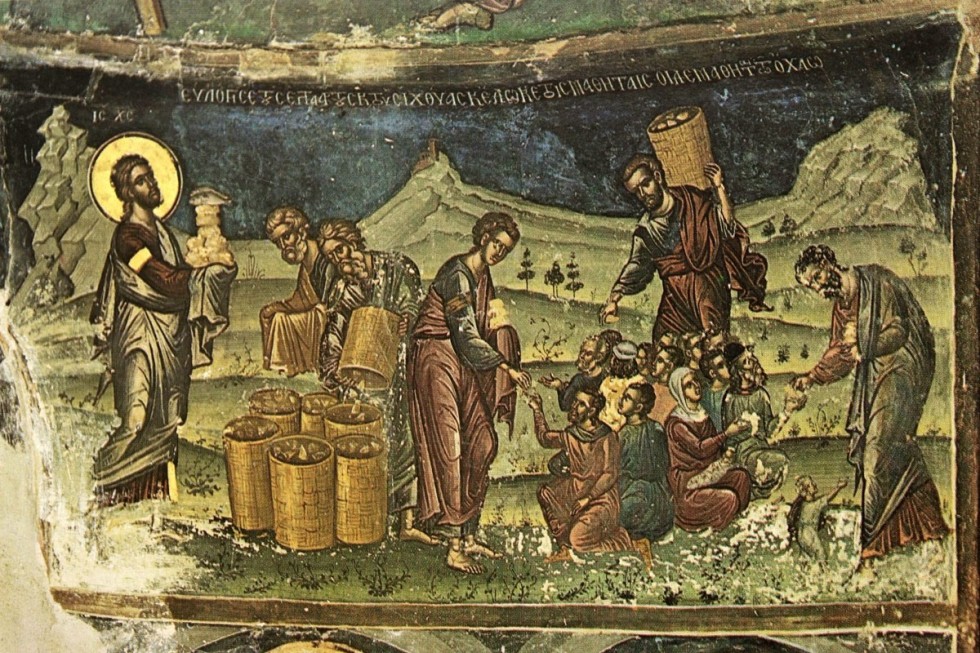
Blessing of the loaves and fishes. Mural, 16th century. Greece
“In our day and age that tradition has almost been lost,” continued Professor Gzgzjan. “and, in general, you have correctly understood the position of Fr. Georgy’s critics: it is as if there exists a certain closed body of knowledge inherent to the Christian faith, which is absolutely perfect and is called ‘Orthodoxy’, and this body of knowledge has been fixed by seven Ecumenical Councils. And from this comes the reproach, made to Fr. Georgy: how is it that he thinks he is introducing people to a tradition when he doesn’t clarify the church councils right off the bat?
“The degree to which that approach is valid from an ideological standpoint is clear enough: ‘Marx’s teaching is all-powerful, because it’s correct’, says David Mkrtichevich. “But the fact is that from a historical point of view the experience of the Ecumenical Councils is extremely problematic and demands very careful study. And there is also the question of how fit-for-purpose the phenomenon of Ecumenical Councils really is and where they came from as an experience within history – not only in an ecclesial context but also in a political context – insofar as from the first to the last, the Councils were initiated by heads of state, i.e. emperors, etc. In other words, Councils, both ecumenical/universal and local, are a product of activity which turned into a collection of “rules of faith” and of ecclesial governance. They very much require careful and critical research.”
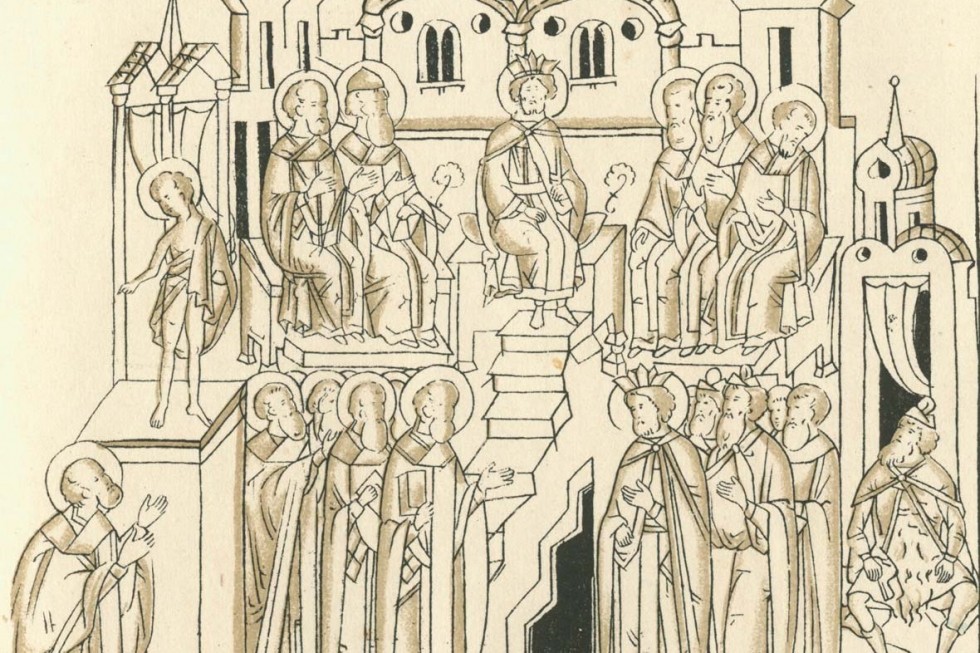
1st Ecumenical Council. Fragment of an original, from the Stroganov manual of icon-proportion standards (Строгановский иконописный лицевой подлинник), end of the 16th – beginning of the 17th century. Rus. Published in Moscow in 1869. Belonged to Count Sergei Gregorjevich Stroganov.
“The more a person knows, the better,” says Fr. Georgy. “Moreover, the first centuries of the church’s existence were very productive, especially in terms of theology and anthropology. To this day we find places in writings from the 1st and 2nd centuries, and to some degree from the 3rd century, which we haven’t fully worked through. From the 4th century there is already too much influence from NeoPlatonism, and this influenced the way in which dogmas were expressed. Yes, you need to know these formulae and understand why they are the way they are. It’s important to become familiar with this, but to be able to explain in detail is something more for professional theologians. For a simple, educated person, it’s just important to understand the sense of one affirmation or another and to know the limits it sets. After all, when we designate a norm or rule this always implies some sort of limitation. And there are limits in the arena of faith, too, only it is very important not to narrow these limits artificially, because then we end up with obscurantism. But at the same time, we must not artificially remove or broaden the boarders, because then people no longer maintain responsibility for their faith and can’t sense contradictions between spirit and meaning.
“Just like with the Bible, the Councils contain a lot of very different materials,” adds Fr. Georgy. “There are very serious, deep things, and some things which are purely historical and are interesting only to a narrow group of specialists. And not every letter in the Scriptures needs be taught to everyone. For the majority of people, it is sufficient to simply read the Bible. Therefore, we teach everything, of course, but place an accent on that which has existential meaning for the life of a particular person at various stages in his spiritual development and on that which is necessary to understanding of our own age, our contemporaries, and the meaning of history, which is revealed to us also in its past and future aspects.
“For this reason, it is critically important to have a system for theological education, just as it is to have a system for teaching the Christian life,” says Fr. Georgy. “And the fact that we often get criticized in a non-meaningful way – this sort of thing isn’t unique to the church. We see this sort of thing when people don’t understand the contents of catechetical books, and criticize the lack of dogmatic teaching in places where dogma isn’t what we mean to accentuate in the curriculum at a given point.”
Part 1: Can we expect a burst of energy similar to the birth of Christ in the near future?
The “Physics and Theology” seminar has been a part of life at SFI since 2013. Its goal is to restore the tradition of free-flowing dialogue between representatives of the hard sciences and of Christian Theology.
The following people took part in the round table discussion on the 27th of December, 2020: Boris Aliev – Associate Professor at the Moscow State University of Design and Technology; Vladimir Velichanskij – Chief Research Scientist at the Lebedev Physical Institute of the Russian Academy of Sciences; Dmitry Gasak – First Vice-Rector at St. Philaret’s Orthodox Christian Institute (SFI); David Gzgzjan – Dean of the SFI Faculty of Theology; Gennady Gorelik – Research Fellow at the Centre for Philosophy and the History of Science at Boston University; Dmitry Zimin – Trustee and Honorary Preseident at the company VimpelCom, Founder of the Dynastia Fund and the Prosvetitelj Prize (Enlightener Prize); Maxim Zelnikov – Senior Researcher at the Lebedev Physical Institute of the Russian Academy of Sciences and Senior Lecturer at SFI; Natalia Ivlieva – Researcher at the Institute of Higher Nervous Activity and Neurophysiology of the Russian Academy of Sciences; Aleksandr Kopirovsky – Head of the Department of Theology at SFI; Fr. Georgy Kochetkov – Editor-in-Chief of the SFI Quarterly Journal (“Vestnik SFI”); Ivan Lupandin – Associate Professor in Philosophy at the Moscow Institute of Physics and Technology; Larisa Musina – SFI Vice Rector for Academic Work and teacher of New Testament; Ekaterina Polyakova – Privat-Docent (Freelance Lecturer) at Ernst-Moritz-Arndt-Universität Greifswald and Associate Professor at SFI; Sergei Rubin – Professor of General Physics and Particle Physics at Moscow Engineering Physics Institute National Nuclear University; Aleksej Starobinskij – Chief Researcher at the Landau Institute of Theoretical Physics and member of the Russian Academy of Sciences; Galina Shpatakovskaja – Chief Researcher at the Keldysha Institute of Applied Mathematics and Associate Professor at SFI.
